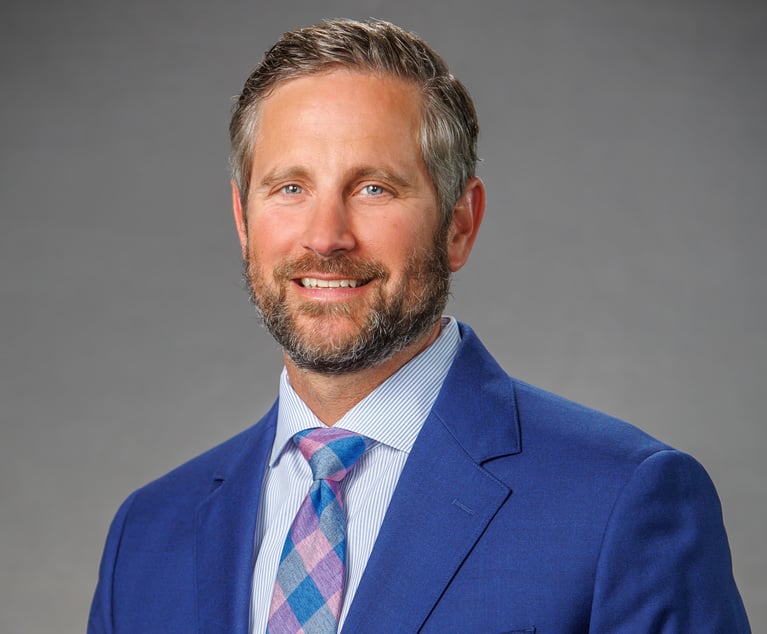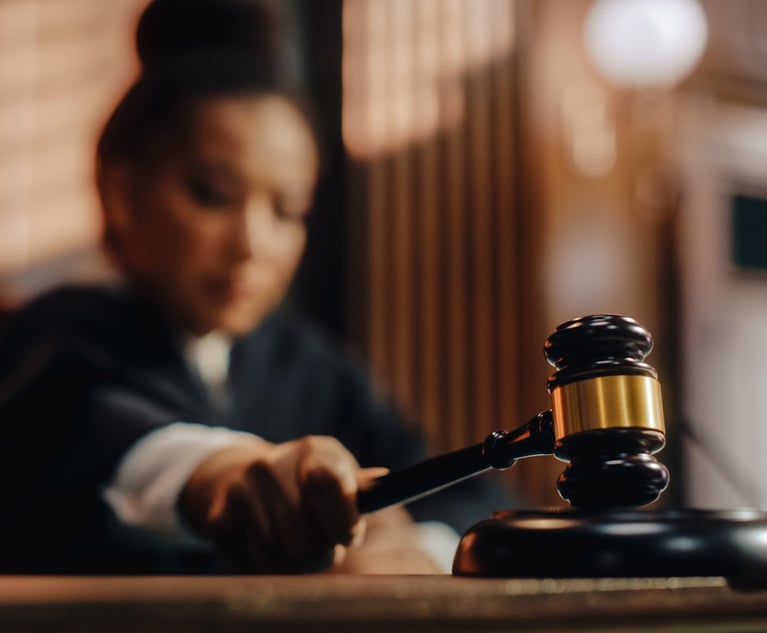Attorneys Question Phila. Judge's Decision to Replace DA With Special Prosecutor
A Philadelphia judge's decision last month to appoint a special prosecutor to pursue a violation of probation hearing was an unusual move, according to several attorneys, and may not pass constitutional muster.
October 03, 2018 at 06:25 PM
6 minute read
 Philadelphia's skyline. Photo: Shutterstock.com
Philadelphia's skyline. Photo: Shutterstock.com
A Philadelphia judge's decision last month to appoint a special prosecutor to pursue a violation of probation hearing was an unusual move, according to several attorneys, and may not pass constitutional muster.
According to court documents, in mid-September, Philadelphia Court of Common Pleas Judge Anne Marie Coyle appointed a special prosecutor in the case Commonwealth v. Mayfield. The defendant, Demetrius Mayfield, had previously been convicted on a gun charge and was out on probation when he was arrested in early September on new charges related to alleged gun and drug possession.
The dispute arose after the Philadelphia District Attorney's Office chose to delay the violation of probation hearing until after Mayfield, who has been in jail since his latest arrest, has been tried on the latest charges.
Prosecutors contended that they were within their discretion to delay the hearing, but, in fiery courtroom exchanges, Coyle determined that prosecutors from the DA's Office had “removed themselves” from handling the case, and, on Sept. 19, she appointed a special prosecutor to handle the parole violation hearing.
The case was first reported on by PhillyVoice.com.
According to transcripts of the proceedings on Sept. 19, 20 and 27, there were several contentious exchanges between the judge, prosecutors and Mayfield's attorney about the judge's authority to make such an appointment, whether the judge was acting outside her role, and the merits of new policies put in place during District Attorney Larry Krasner's tenure.
“I'm sorry the district attorney does not like the law as it exists. My suggestion is if you don't like the law as it exists, talk to your legislature,” Coyle said on Sept. 27, according to transcripts. “It is the job of the district attorney to enforce the law as it exists and represent the interests of the commonwealth of Pennsylvania. Not the law that he wishes it to be.”
Several criminal defense attorneys and former prosecutors who spoke with The Legal, however, said they were shocked by the judge's decision, and that it may go against the separation of powers doctrine, which was an argument espoused by the attorneys in Mayfield as part of their effort to have Coyle reconsider her decision to appoint the special prosecutor.
The District Attorney's Office has since appealed Coyle's decision to the state Superior Court.
Defense attorney Matthew Mangino, formerly the Lawrence County district attorney, said the case was “extraordinary.”
“I'm not familiar with all the intricacies of Philadelphia politics, and I know the new DA is not from a proprietorial pedigree, so to speak, but it is his office, and he acts on behalf of the commonwealth. I don't know of any statute that would provide authority to a judge to appoint a special prosecutor” under those circumstances, he said. “I can appreciate that a judge wants to go forward with a case, and thinks it is appropriate for the case to be heard expeditiously. And that's consistent with the judge's idea of justice, but the decision to prosecute that case is solely and exclusively within the DA's Office.”
Philadelphia defense attorney William Spade, like several other attorneys, said he has seen special prosecutors appointed if a DA's Office is conflicted out of a case, but he said he has never seen a situation similar to the Mayfield case.
“I've never heard of this situation before,” he said.
Defense attorney and former Montgomery County prosecutor Steven Fairlie of Fairlie & Lippy agreed.
“I've never heard of anything approaching that,” he said, adding that sometimes special prosecutors with specific areas of expertise can also be appointed to assist a prosecutor's office, but that is at the request of the prosecutor's office. ”I'm not aware of any authority for the judge to appoint a special prosecutor because the judge doesn't like the elected prosecutor's exercise of discretion.”
Both Mangino and Kevin Mincey of Mincey & Fitzpatrick said the appointment was “troubling.”
“It's like the judge is almost looking for someone to do her bidding,” Mincey said. “If I was the defense attorney on this case I would be asking for a recusal.”
Defense attorney and former Bucks County prosecutor David Zellis, echoing sentiments from other defense attorneys, said the appointment may have overstepped the separation of powers between the executive branch and the judicial branch.
“To me, the thing that sticks out, is that, potentially, there's a constitutional issue raised between the executive branch and the judicial branch. The judicial branch may be overstepping its bounds,” Zellis said. “Judge Coyle is concerned about the safety and security of the community. She has great intentions, but is this something that is within her power?”
As part of their reasoning for not pursuing the probation violation hearing before the trial, prosecutors argued in court papers that it would lead to a host of appellate issues. According to transcripts, the decision not to pursue the probation violation hearing before the trial came from First Assistant District Attorney Carolyn Engel Temin.
Ben Waxman, spokesman for the District Attorney's Office, said the DA's Office policy is to consider the issue on a case-by-case basis, and each decision requires approval from the first assistant. He declined to comment further about the case.
Former prosecutors Zellis and Mangino both said it is not uncommon for prosecutors to delay a violation of probation hearing until after trial. Mangino said it is a way to streamline the process.
“It's rare to proceed with the probation violation before trying the new offense. Especially in a situation where, as exists here, where, oftentimes, probation can put a detainer on an individual so they sit in jail, and they're no longer a threat to the public,” he said. “If there's a conviction, then that probation revocation hearing is very simple. You come in with a verdict. There's no defense to that at that point.”
The attorney who was appointed as special prosecutor in Mayfield was James Lloyd of Parkinson, Tarpey & Lloyd. According to transcripts, Coyle chose Lloyd using the “wheel” that is used for selecting court-appointed defense counsel. Lloyd did not return a call seeking comment.
Mayfield's attorney, Joseph Coleman of Montoya Coleman, said he felt Coyle was “acting as an advocate,” and against the separation of powers doctrine. But, more than that, he said he was concerned about his client's due process rights.
“He's innocent until proven guilty, and to me, by forcing a violation of probation hearing before we have the chance to present a full and fair defense is stripping him of the presumption of innocence,” Coleman said.
The Legal asked both the District Attorney's Office and the First Judicial District who is expected to pay for the special prosecutor and how much will his appointment likely cost. Waxman referred comment to the FJD, and an FJD spokesman declined to comment.
This content has been archived. It is available through our partners, LexisNexis® and Bloomberg Law.
To view this content, please continue to their sites.
Not a Lexis Subscriber?
Subscribe Now
Not a Bloomberg Law Subscriber?
Subscribe Now
NOT FOR REPRINT
© 2025 ALM Global, LLC, All Rights Reserved. Request academic re-use from www.copyright.com. All other uses, submit a request to [email protected]. For more information visit Asset & Logo Licensing.
You Might Like
View All
Kline & Specter and Bosworth Resolve Post-Settlement Fighting Ahead of Courtroom Showdown
6 minute read

'Discordant Dots': Why Phila. Zantac Judge Rejected Bid for His Recusal
3 minute read
Phila. Court System Pushed to Adapt as Justices Greenlight Changes to Pa.'s Civil Jury Selection Rules
5 minute readTrending Stories
- 15th Circuit Considers Challenge to Louisiana's Ten Commandments Law
- 2Crocs Accused of Padding Revenue With Channel-Stuffing HEYDUDE Shoes
- 3E-discovery Practitioners Are Racing to Adapt to Social Media’s Evolving Landscape
- 4The Law Firm Disrupted: For Office Policies, Big Law Has Its Ear to the Market, Not to Trump
- 5FTC Finalizes Child Online Privacy Rule Updates, But Ferguson Eyes Further Changes
Who Got The Work
J. Brugh Lower of Gibbons has entered an appearance for industrial equipment supplier Devco Corporation in a pending trademark infringement lawsuit. The suit, accusing the defendant of selling knock-off Graco products, was filed Dec. 18 in New Jersey District Court by Rivkin Radler on behalf of Graco Inc. and Graco Minnesota. The case, assigned to U.S. District Judge Zahid N. Quraishi, is 3:24-cv-11294, Graco Inc. et al v. Devco Corporation.
Who Got The Work
Rebecca Maller-Stein and Kent A. Yalowitz of Arnold & Porter Kaye Scholer have entered their appearances for Hanaco Venture Capital and its executives, Lior Prosor and David Frankel, in a pending securities lawsuit. The action, filed on Dec. 24 in New York Southern District Court by Zell, Aron & Co. on behalf of Goldeneye Advisors, accuses the defendants of negligently and fraudulently managing the plaintiff's $1 million investment. The case, assigned to U.S. District Judge Vernon S. Broderick, is 1:24-cv-09918, Goldeneye Advisors, LLC v. Hanaco Venture Capital, Ltd. et al.
Who Got The Work
Attorneys from A&O Shearman has stepped in as defense counsel for Toronto-Dominion Bank and other defendants in a pending securities class action. The suit, filed Dec. 11 in New York Southern District Court by Bleichmar Fonti & Auld, accuses the defendants of concealing the bank's 'pervasive' deficiencies in regards to its compliance with the Bank Secrecy Act and the quality of its anti-money laundering controls. The case, assigned to U.S. District Judge Arun Subramanian, is 1:24-cv-09445, Gonzalez v. The Toronto-Dominion Bank et al.
Who Got The Work
Crown Castle International, a Pennsylvania company providing shared communications infrastructure, has turned to Luke D. Wolf of Gordon Rees Scully Mansukhani to fend off a pending breach-of-contract lawsuit. The court action, filed Nov. 25 in Michigan Eastern District Court by Hooper Hathaway PC on behalf of The Town Residences LLC, accuses Crown Castle of failing to transfer approximately $30,000 in utility payments from T-Mobile in breach of a roof-top lease and assignment agreement. The case, assigned to U.S. District Judge Susan K. Declercq, is 2:24-cv-13131, The Town Residences LLC v. T-Mobile US, Inc. et al.
Who Got The Work
Wilfred P. Coronato and Daniel M. Schwartz of McCarter & English have stepped in as defense counsel to Electrolux Home Products Inc. in a pending product liability lawsuit. The court action, filed Nov. 26 in New York Eastern District Court by Poulos Lopiccolo PC and Nagel Rice LLP on behalf of David Stern, alleges that the defendant's refrigerators’ drawers and shelving repeatedly break and fall apart within months after purchase. The case, assigned to U.S. District Judge Joan M. Azrack, is 2:24-cv-08204, Stern v. Electrolux Home Products, Inc.
Featured Firms
Law Offices of Gary Martin Hays & Associates, P.C.
(470) 294-1674
Law Offices of Mark E. Salomone
(857) 444-6468
Smith & Hassler
(713) 739-1250





